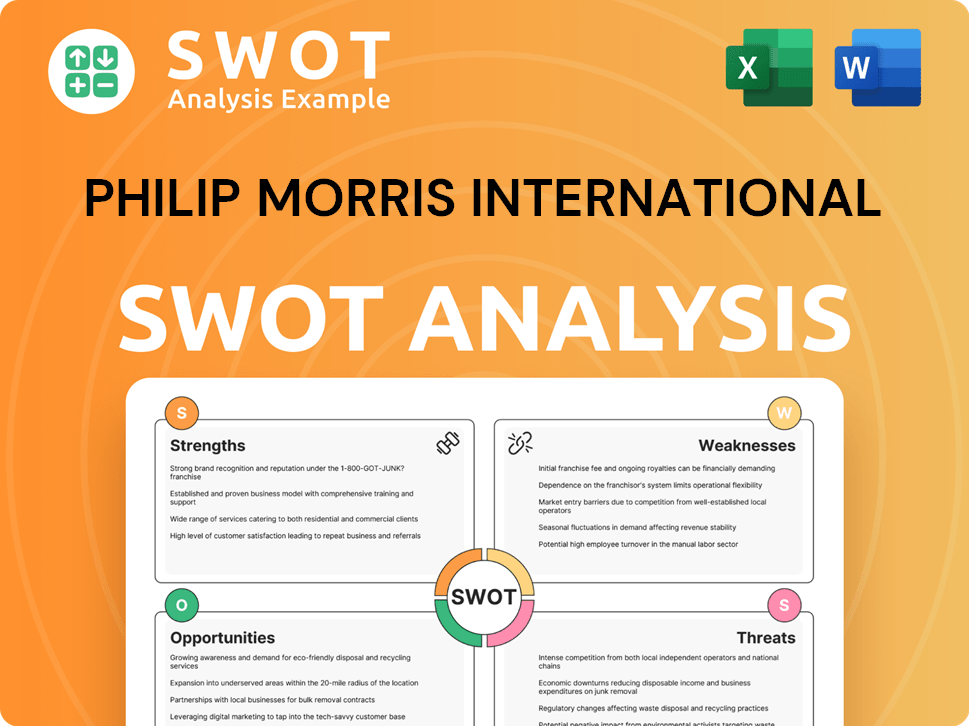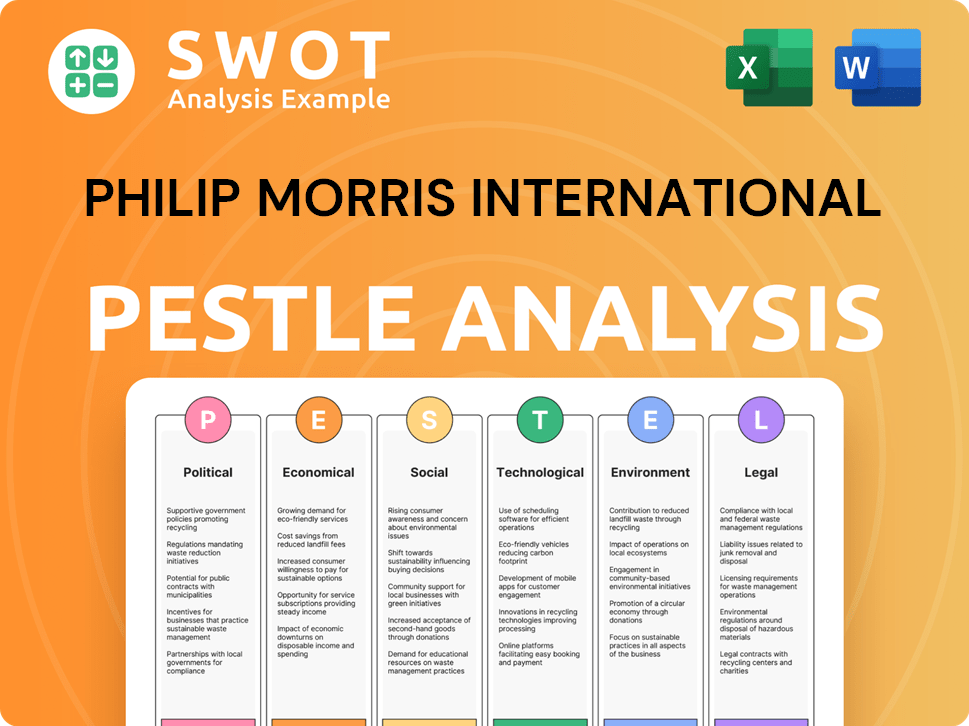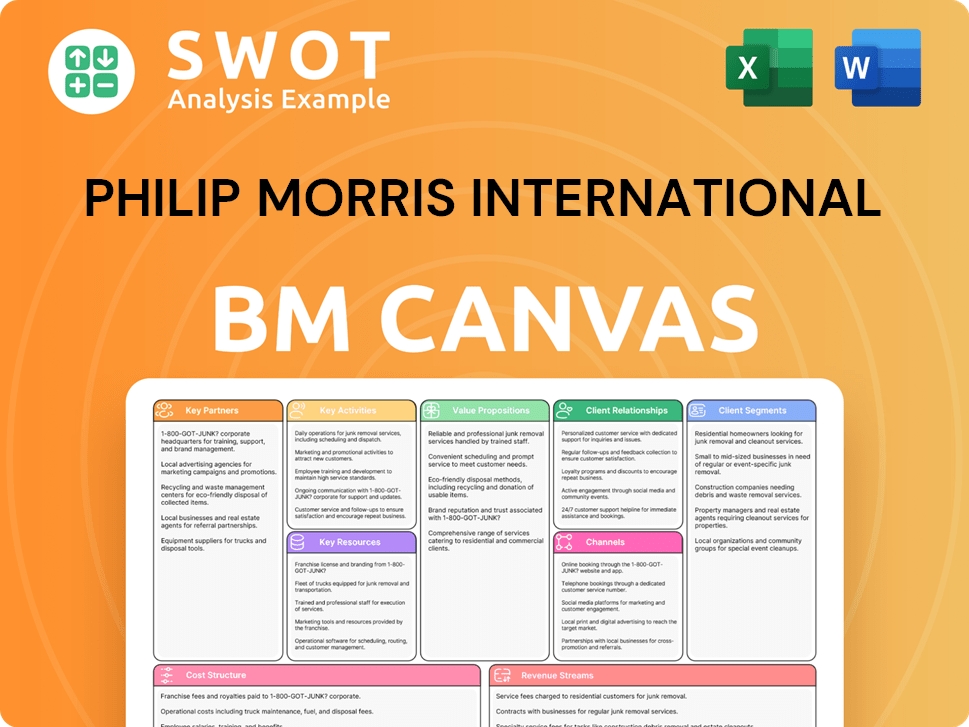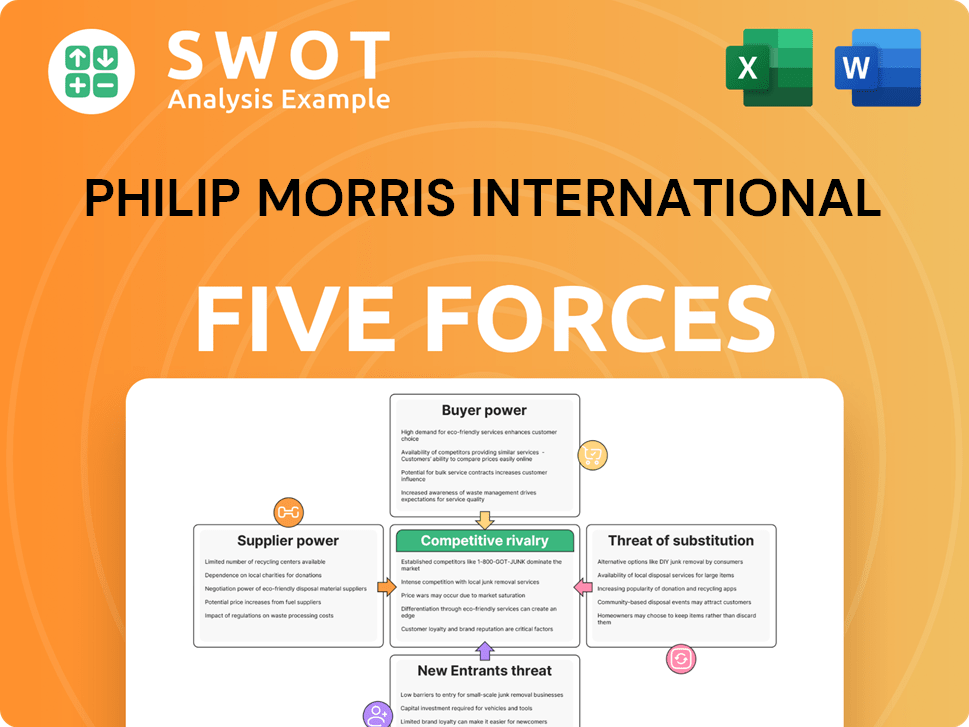Philip Morris International Bundle
What Drives Philip Morris International's Transformation?
Embark on a journey to understand the core principles propelling Philip Morris International (PMI) through a significant industry shift. Discover how PMI's mission, vision, and core values are shaping its future in a rapidly evolving market, particularly with its focus on smoke-free alternatives.

Delving into the Philip Morris International SWOT Analysis, we see how these foundational elements guide its strategic decisions and influence its commitment to a smoke-free future. Understanding PMI's mission and vision is key to grasping its long-term strategy and its approach to navigating the complexities of the global tobacco market. Explore how PMI's core values are influencing its product innovation, market strategies, and commitment to sustainability.
Key Takeaways
- PMI's mission and vision drive its shift to smoke-free products.
- Smoke-free products significantly boosted PMI's revenue in 2024 and early 2025.
- Core values of caring, collaboration, and innovation guide PMI's strategy.
- Alignment with principles is vital for navigating industry challenges.
- PMI's transformation raises questions about corporate responsibility and innovation's role in public health.
Mission: What is Philip Morris International Mission Statement?
PMI's mission is 'to focus resources on developing and responsibly commercializing smoke-free products that are less harmful than smoking to replace cigarettes.'
The mission of Philip Morris International (PMI) is a bold declaration of transformation, charting a course away from traditional cigarettes and towards a smoke-free future. This strategic shift is not merely a change in product offerings; it represents a fundamental re-evaluation of the company's role in the tobacco industry and its commitment to public health. This commitment is evident in their business model, which is further explained in detail in this article: Revenue Streams & Business Model of Philip Morris International.
PMI's mission is laser-focused on adult smokers who would otherwise continue to smoke combustible cigarettes. The company aims to provide these individuals with scientifically substantiated, less harmful alternatives, thereby reducing the health risks associated with smoking. This targeted approach is crucial to understanding PMI's strategic intent.
The core of PMI's mission revolves around smoke-free products. These include heated tobacco units (HTUs) like IQOS, e-vapors like VEEV, and oral nicotine products like ZYN. These products are designed to deliver nicotine without the combustion associated with traditional cigarettes, which is the primary source of harmful chemicals.
PMI operates on a global scale, with its mission impacting numerous international markets. This global presence allows the company to reach a vast audience of adult smokers and offer them smoke-free alternatives across various regions. The international scope is a key element of PMI's strategy.
The unique value proposition of PMI lies in providing less harmful alternatives to combustible cigarettes. This approach aims to reduce the health impact associated with smoking, offering a pathway for adult smokers to transition to potentially reduced-risk products. This is central to PMI's commitment.
PMI's commitment to its mission is evident in its substantial investment in research and development of smoke-free technologies. Since 2008, the company has invested over $14 billion in this area. This significant financial commitment underscores the importance of innovation in achieving its goals.
The increasing portion of revenue derived from smoke-free products is a clear indicator of PMI's strategic shift. In 2024, smoke-free products accounted for approximately 39% of total net revenues, and this figure rose to 42% in the first quarter of 2025. This trend highlights the growing importance of smoke-free products to the company's financial performance.
This mission is inherently innovation-focused, driven by the development of new technologies and increasingly customer-centric, aiming to provide adult smokers with better choices. PMI's strategic goals are clearly defined by this mission, and its long-term vision is centered on a smoke-free future. The company's commitment to sustainability is also intertwined with its mission, as it seeks to minimize the environmental impact of its products and operations. The impact of PMI's mission on its products is significant, with a clear emphasis on harm reduction. The core values of Philip Morris International are closely aligned with its mission, guiding its business ethics and strategic decisions. Understanding how PMI approaches its core values provides further insight into its operations. PMI communicates its mission and vision through various channels, ensuring transparency and stakeholder engagement.
Philip Morris International SWOT Analysis
- Complete SWOT Breakdown
- Fully Customizable
- Editable in Excel & Word
- Professional Formatting
- Investor-Ready Format

Vision: What is Philip Morris International Vision Statement?
PMI's vision is "We are delivering a smoke-free future: a future in which all adult smokers who do not quit switch to new smoke-free products and abandon cigarettes."
The PMI vision is a bold declaration of intent, signaling a dramatic shift in the company's core business and its role in the global tobacco market. This future-focused statement underscores a commitment to innovation and a willingness to redefine the industry. This vision is not merely a marketing slogan; it's a strategic roadmap guiding the company's investments, product development, and market strategies. This vision is a core element of the overall Target Market of Philip Morris International.
The vision is explicitly future-oriented, focusing on a transformation of the tobacco industry. It moves beyond the traditional focus on cigarettes, embracing a future dominated by smoke-free products. This forward-looking approach is crucial for long-term sustainability and market leadership.
The vision has a global scope, aiming to impact adult smokers worldwide. It acknowledges the diverse preferences and behaviors of smokers across different markets. The goal is to provide alternatives to cigarettes for those who choose to continue using nicotine products.
The vision is ambitious, setting a high bar for the company. It aims for a future where cigarettes are obsolete, which is a significant disruption to the established tobacco industry. This ambition drives innovation and investment in smoke-free alternatives.
The vision is supported by substantial investment in research, development, and market expansion of smoke-free products. By the end of 2024, PMI's smoke-free products were available in 95 markets. This investment demonstrates the company's commitment to achieving its vision.
PMI’s smoke-free products have achieved significant market penetration, with an estimated 38.6 million adult users globally by the end of 2024. This growing user base validates the company's strategy and indicates progress towards its vision.
PMI is expanding into wellness and healthcare areas, indicating a broader long-term market leadership ambition beyond traditional nicotine products. This diversification strategy aligns with the vision of a healthier future and positions the company for future growth.
Philip Morris International PESTLE Analysis
- Covers All 6 PESTLE Categories
- No Research Needed – Save Hours of Work
- Built by Experts, Trusted by Consultants
- Instant Download, Ready to Use
- 100% Editable, Fully Customizable

Values: What is Philip Morris International Core Values Statement?
Philip Morris International (PMI) operates under a distinct set of core values, collectively known as the PMI DNA, which guide its operations and strategic direction. These values are central to PMI's transformation and its commitment to a smoke-free future.
This value emphasizes empathy, mindfulness, and mutual support within PMI. It is reflected in initiatives focused on employee well-being, diversity, equity, and inclusion. PMI has been recognized as a Global Top Employer for several years, demonstrating its commitment to a positive work environment. In customer relations, 'We Care' is demonstrated through the aim to provide adult smokers with better alternatives and information about the risks of smoking.
This value highlights the importance of collaboration and collective strength. In product development, it brings together diverse expertise in science, technology, and consumer insights to create innovative smoke-free products. In business practices, it underscores the need for partnerships and stakeholder engagement to achieve the smoke-free future. The success of PMI's transformation hinges on strong collaborations, as seen in its partnerships for product distribution and technology development.
This value signifies a commitment to innovation, resilience, and driving positive change. It is evident in PMI's significant investment in R&D for smoke-free products and its ambitious goal to transition away from cigarettes. This value drives the company to challenge the status quo and lead the transformation of the industry. PMI has invested over $10.5 billion in research and development of smoke-free products as of the end of 2023, showcasing its commitment to being a game changer.
While not explicitly named a core value, PMI's commitment to sustainability and responsible business practices is integral to its overall approach. This includes environmental initiatives, ethical sourcing, and reducing the impact of its products. PMI's sustainability efforts are increasingly important, with the company aiming to reduce its environmental footprint and promote responsible business conduct. For example, PMI has set ambitious targets for reducing its carbon emissions and promoting circular economy practices.
These core values are fundamental to understanding the Marketing Strategy of Philip Morris International and its long-term vision. They shape PMI's strategic decisions and influence its approach to product development, market engagement, and corporate responsibility. The next chapter will explore how the PMI mission and vision influence the company's strategic decisions.
How Mission & Vision Influence Philip Morris International Business?
The mission and vision of Philip Morris International (PMI) are not merely aspirational statements; they serve as the foundational drivers of the company's strategic decisions. These guiding principles shape everything from product development and market expansion to long-term planning, ensuring a cohesive and focused approach to achieving its goals.
PMI's commitment to its mission is evident in its substantial financial investments. Since 2008, the company has invested over $14 billion in research, development, and commercialization of smoke-free products. This significant allocation of resources underscores the company's dedication to transitioning away from traditional cigarettes.
- This investment is a direct result of the mission to replace cigarettes with less harmful alternatives.
- The focus is on innovation in heated tobacco, e-vapor, and oral nicotine technologies.
- This strategy is a core component of the overall Mission, Vision & Core Values of Philip Morris International.
The acquisition of Swedish Match in 2022, a leader in oral nicotine delivery, exemplifies PMI's strategic alignment with its vision. This move significantly bolstered PMI's smoke-free portfolio, adding brands like ZYN to its offerings. This acquisition is a clear indication of PMI's dedication to providing a range of smoke-free options to adult smokers.
PMI's mission and vision drive its global market expansion efforts. Smoke-free products are now available in 95 markets worldwide. This expansion is a key strategic decision to increase the reach of smoke-free alternatives and contribute to the smoke-free future.
The mission and vision have profoundly influenced product development, shifting the focus from improving traditional cigarettes to innovating in heated tobacco, e-vapor, and oral nicotine technologies. This shift is central to PMI's strategy.
The impact of PMI's mission and vision is reflected in key performance indicators. The percentage of net revenue from smoke-free products has increased significantly, reaching approximately 39% in 2024 and 42% in Q1 2025. The number of adult smoke-free product users has also grown, reaching 38.6 million by the end of 2024.
PMI's mission and vision shape its long-term planning, setting a clear goal of becoming substantially smoke-free by 2030, with over two-thirds of net revenues from smoke-free products. CEO Jacek Olczak has emphasized the company's rapid progress in its smoke-free transformation and the goal of making cigarettes obsolete as soon as possible.
PMI's core values are evident in its commitment to a smoke-free future. The company's strategic decisions, from investments in product development to market expansion, are all geared towards achieving this vision. This commitment is a key aspect of PMI's long-term strategy and corporate identity.
In essence, PMI's mission and vision are not just words; they are the driving force behind its strategic initiatives and future direction. The company's actions, investments, and goals all align with its commitment to a smoke-free future. Next, we will explore the core improvements to the company's mission and vision.
Philip Morris International Business Model Canvas
- Complete 9-Block Business Model Canvas
- Effortlessly Communicate Your Business Strategy
- Investor-Ready BMC Format
- 100% Editable and Customizable
- Clear and Structured Layout

What Are Mission & Vision Improvements?
While Philip Morris International (PMI) has made significant progress in its transformation, there's room for enhancement in its mission and vision statements to further solidify its commitment to public health and its leadership in the evolving nicotine landscape. These improvements can help PMI better align with evolving consumer perceptions and regulatory changes.
How Does Philip Morris International Implement Corporate Strategy?
The successful implementation of Philip Morris International's (PMI) mission and vision is crucial for achieving its strategic goals and driving long-term value. This involves translating aspirational statements into tangible actions across all facets of the business, from product development to stakeholder engagement.
PMI's commitment to a smoke-free future is actively implemented through several key initiatives, primarily focusing on the development, global rollout, and marketing of reduced-risk products (RRPs). This strategy is central to achieving the PMI mission and realizing its PMI vision.
- Global Rollout of Smoke-Free Products: The company continues to expand the availability of its flagship smoke-free product, IQOS, and other alternatives like ZYN, across various markets. As of Q1 2024, IQOS was available in 81 markets. PMI aims to have over 100 markets by 2025.
- Marketing and Communication: PMI actively promotes its smoke-free products as better alternatives to cigarettes for adult smokers who would otherwise continue to smoke. This includes targeted advertising campaigns and educational initiatives.
- Innovation and R&D: PMI invests heavily in research and development to create and improve smoke-free products, supported by a strong portfolio of intellectual property. In 2023, PMI invested $1.1 billion in R&D.
- Regulatory Engagement: PMI works with regulatory bodies to ensure appropriate frameworks for smoke-free products, advocating for evidence-based policies that support the transition away from cigarettes.
Effective leadership and clear communication are essential for embedding the PMI mission and PMI vision throughout the organization. The CEO and other executives play a crucial role in driving this transformation.
PMI's leadership regularly communicates the importance of the smoke-free transformation to employees, investors, and the public through various channels.
PMI actively engages with stakeholders to communicate its mission, vision, and progress. Transparency is key to building trust and demonstrating accountability.
The company uses multiple channels to communicate its strategy and performance, including annual reports, investor presentations, the company website, and employee communications. The 2024 Integrated Report provides a detailed overview of the company's progress toward its smoke-free vision and sustainability goals.
PMI strives to ensure that its stated PMI core values are reflected in its business practices and internal culture. This alignment is crucial for long-term success and ethical conduct.
The PMI DNA principles, developed with employee input, guide internal interactions and decision-making. Furthermore, PMI links sustainability performance to executive compensation, reinforcing its commitment to long-term goals. The company's recognition as a Global Top Employer for the ninth consecutive year in 2025 underscores its commitment to a positive and values-driven workplace.
PMI integrates sustainability into its business strategy, recognizing its importance for long-term value creation. This includes environmental, social, and governance (ESG) considerations.
PMI has set ambitious sustainability targets, including reducing its environmental footprint and promoting responsible sourcing. The company's commitment to sustainability is detailed in its integrated reports and on its website. For a deeper understanding of the competitive landscape, consider exploring the Competitors Landscape of Philip Morris International.
Philip Morris International Porter's Five Forces Analysis
- Covers All 5 Competitive Forces in Detail
- Structured for Consultants, Students, and Founders
- 100% Editable in Microsoft Word & Excel
- Instant Digital Download – Use Immediately
- Compatible with Mac & PC – Fully Unlocked

Related Blogs
- What are Mission Vision & Core Values of Philip Morris International Company?
- What is Competitive Landscape of Philip Morris International Company?
- What is Growth Strategy and Future Prospects of Philip Morris International Company?
- How Does Philip Morris International Company Work?
- What is Sales and Marketing Strategy of Philip Morris International Company?
- Who Owns Philip Morris International Company?
- What is Customer Demographics and Target Market of Philip Morris International Company?
Disclaimer
All information, articles, and product details provided on this website are for general informational and educational purposes only. We do not claim any ownership over, nor do we intend to infringe upon, any trademarks, copyrights, logos, brand names, or other intellectual property mentioned or depicted on this site. Such intellectual property remains the property of its respective owners, and any references here are made solely for identification or informational purposes, without implying any affiliation, endorsement, or partnership.
We make no representations or warranties, express or implied, regarding the accuracy, completeness, or suitability of any content or products presented. Nothing on this website should be construed as legal, tax, investment, financial, medical, or other professional advice. In addition, no part of this site—including articles or product references—constitutes a solicitation, recommendation, endorsement, advertisement, or offer to buy or sell any securities, franchises, or other financial instruments, particularly in jurisdictions where such activity would be unlawful.
All content is of a general nature and may not address the specific circumstances of any individual or entity. It is not a substitute for professional advice or services. Any actions you take based on the information provided here are strictly at your own risk. You accept full responsibility for any decisions or outcomes arising from your use of this website and agree to release us from any liability in connection with your use of, or reliance upon, the content or products found herein.